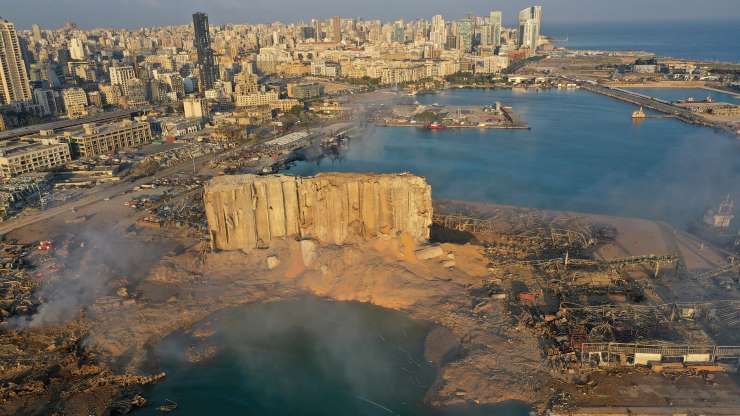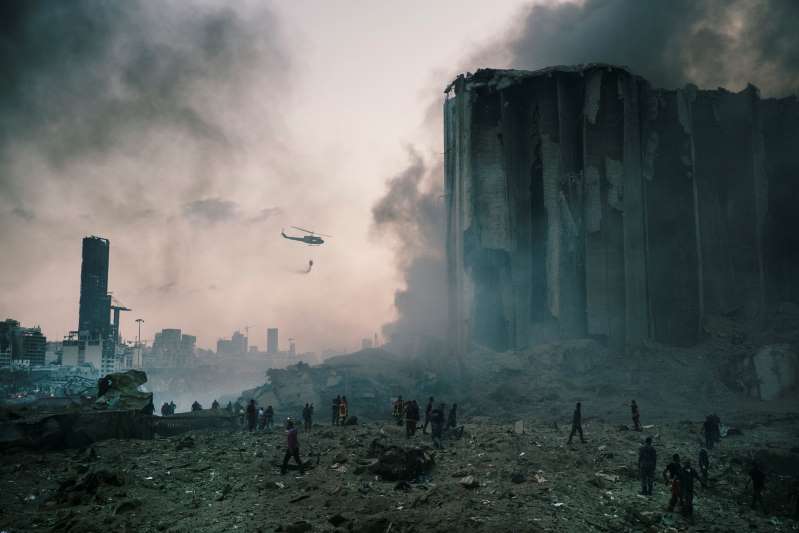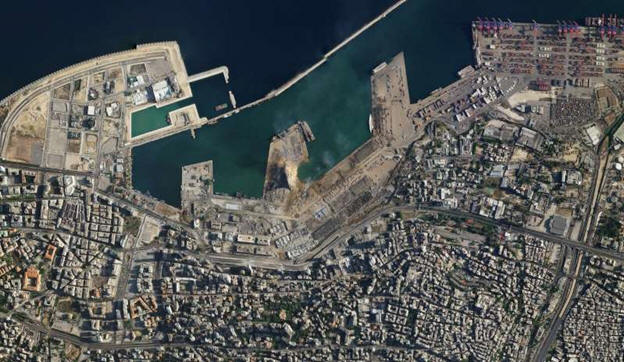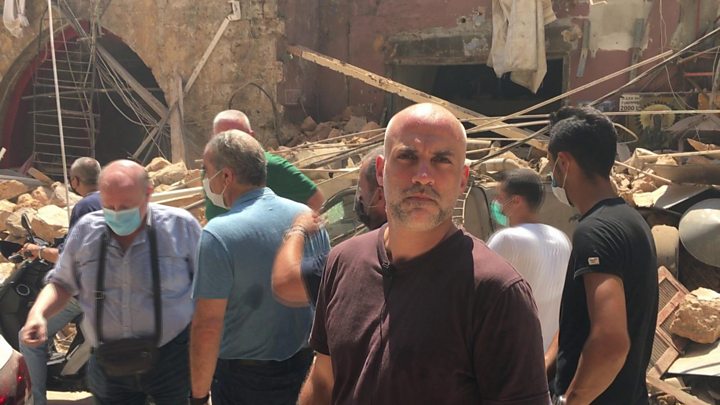www.aljazeerah.info
News, August 2020
Archives
Mission & Name
Conflict Terminology
Editorials
Gaza Holocaust
Gulf War
Isdood
Islam
News
News Photos
Opinion Editorials
US Foreign Policy (Dr. El-Najjar's Articles)
www.aljazeerah.info
|
Editorial Note: The following news reports are summaries from original sources. They may also include corrections of Arabic names and political terminology. Comments are in parentheses. |
137 People Killed, 5,000 Injured, Dozens Missing, in Beirut Port Ammonium Nitrate Storage Explosion
August 6, 2020
 |
 |
| A view of the Beirut port after the massive explosion on August 4, 2020 |
 |
 |
| The devastation wrought by the massive explosion in Beirut yesterday (Aug. 4) is viscerally apparent in satellite photos | Beirut explosion_ neighborhood devastation, August 4, 2020 |
Beirut Port Blasts Killed at Least 137 People, Dozens Still Missing
The massive blasts at Beirut Port killed at least 137 people, and injured more than 5,000 others, with dozens others still missing, Lebanese Health Minister said Thursday.
Talking to the Voice of Lebanon radio station, Minister Hamad Hasan said the death toll may rise as dozens of people were still missing.
Tuesday’s explosions obliterated part of the port and caused damage over a wide radius in the heart of the city, prompting fears the final death toll could yet rise significantly.
The minister, meanwhile, pointed out that contacts were ongoing with Arab and European countries to help secure medical aid for Lebanon.
“What is mostly required today is to set up field hospitals in different areas of the capital, including military hospitals,” stressed Hassan.
He explained that the Council of Ministers had insisted on its house arrest decision, noting that such decision deemed as evidence of accountability for those responsible.
“It is an indication that the law will have a dominant voice over this issue.”
As for the spiking number of Coronavirus cases, Hassan feared a rise in infections within the next ten days.
“Aiding the wounded and the lack of protective supplies may have an impact on the number of Coronavirus cases,” he added, stressing that some of the field hospitals will be receiving Coronavirus cases.
https://english.almanar.com.lb/1107152
***
Beirut explosion: Angry residents demand answers after blast
BBC, August 6, 2020
People in Beirut have expressed anger at the government over what they say was negligence that led to Tuesday's huge explosion.
President Michel Aoun said the blast was caused by 2,750 tonnes of ammonium nitrate stored unsafely in a warehouse.
Many have accused the authorities of corruption, neglect and mismanagement.
The blast killed at least 137 people and injured about 5,000 others, while dozens are still missing. A two-week state of emergency has begun.
"Beirut is crying, Beirut is screaming, people are hysterical and people are tired," filmmaker Jude Chehab told the BBC, calling for the people responsible to face justice.
"Now I'm shaking, all the way from up to down" - Eyewitnesses describe the power of the explosion
Chadia Elmeouchi Noun, a Beirut resident currently in hospital, said: "I've known all the time that we are led by incompetent people, incompetent government [...] But I tell you something - what they have done now is absolutely criminal."
On Wednesday, the government announced that a number of Beirut port officials were placed under house arrest pending an investigation into the explosion.
The country's Supreme Defence Council insisted that those found responsible would face the "maximum punishment".
Meanwhile, Amnesty International and Human Rights Watch have called for an independent investigation into the blast. In a statement, HRW said it had "serious concerns about the ability of the Lebanese judiciary to conduct a credible and transparent investigation on its own".
What triggered the explosion?
The ammonium nitrate - which is used as a fertiliser in agriculture and as an explosive - had reportedly been in a warehouse in Beirut port for six years after it was unloaded from a ship impounded in 2013.
The head of Beirut port and the head of the customs authority both told local media that they had written to the judiciary several times asking that the chemical be exported or sold on to ensure port safety.
Port General Manager Hassan Koraytem told OTV they had been aware that the material was dangerous when a court first ordered it stored in the warehouse, "but not to this degree".
Media captionRami Ruhayem has been to Gemmayze, the closest residential area to the port
House arrest would apply for all port officials "who have handled the affairs of storing [the] ammonium nitrate, guarding it and handling its paperwork" since June 2014, according to Information Minister Manal Abdel Samad.
The ammonium nitrate arrived on a Moldovan-flagged ship, the Rhosus, which entered Beirut port after suffering technical problems during its voyage from Georgia to Mozambique, according to Shiparrested.com, which deals with shipping-related legal cases.
The Rhosus was inspected, banned from leaving and was shortly afterwards abandoned by its owners, sparking several legal claims. Its cargo was stored in a port warehouse for safety reasons, the report said.
What is the latest on rescue efforts?
Security forces have sealed off a wide area around the blast site, and rescuers have been looking for bodies and survivors under rubble while boats search the waters off the coast. Dozens of people are still missing.
Public Health Minister Hamad Hassan said Lebanon's health sector was short of beds and lacked the equipment necessary to treat the injured and care for patients in critical condition.
As many as 300,000 people have been left homeless by the blast, Beirut's governor Marwan Aboud said.
He told the BBC: "Beirut needs food, Beirut needs clothes, houses, materials to rebuild houses. Beirut needs a place for the refugees, for its people."
Economy Minister Raoul Nehme said the country would have to rely at least partly on foreign aid to rebuild.
"The capacity of the state is very limited, and so is that of the central bank and the banks. We're not swimming in dollars," he told Sky News Arabia.
A number of countries have offered humanitarian assistance. Three French planes are due to arrive carrying 55 rescuers, medical equipment and a mobile clinic equipped to treat 500 people.
On Thursday President Emmanuel Macron became the first world leader to visit the country - a former colony of France - since the tragedy.
The EU, Russia, Tunisia, Turkey, Iran and Qatar are all sending relief supplies. The UK is also ready to send medical experts and humanitarian aid, Foreign Secretary Dominic Raab said.
https://www.bbc.com/news/world-middle-east-53673957
***
Beirut explosion devastation spotted from space (satellite photos)
By Mike Wall
Space, August 6, 2020
This view of the destruction caused by an explosion in the port of Beirut was captured by a SkySat satellite operated by San Francisco-based company Planet on Aug. 5, 2020.
A SkySat spacecraft, operated by San Francisco-based company Planet, captured detailed imagery of the port of Beirut both before and after the blast, which killed at least 135 people and wounded about 5,000, according to The Guardian.
Planet posted the photos on Twitter today (Aug. 5). Colorado-based space technology company Maxar did the same, sharing pictures snapped by its satellites.
Related: Photos of Earth from space by Planet satellites
The bird's-eye views show numerous buildings flattened by the explosion and a semicircular chunk gouged out of the port infrastructure, as if a monster rose out of the waves and took a giant bite.
The blast occurred after a fire reached a warehouse containing 2,750 tons of ammonium nitrate, an explosive compound often used as a fertilizer, Lebanese authorities have said. The ammonium nitrate had reportedly been stored in the warehouse since 2013, when it was offloaded from an impounded ship, the BBC reported.
Investigation into the tragic accident continues, as does the search for its victims.
These photos highlight how effectively private Earth-observation satellites can monitor the goings-on here on terra firma.
For example, Planet's fleet of orbital assets, which numbers in the hundreds, has also identified new earthquake-created ruptures in Earth's crust, spotted the aftermath of a failed Iranian rocket launch and imaged the damage left behind by an Iranian missile attack on Iraqi military installations, among other things.
And the many contributions of Maxar's WorldView satellites include helping humanity assess the impacts of the coronavirus pandemic on a global scale.
Mike Wall is the author of "Out There" (Grand Central Publishing, 2018; illustrated by Karl Tate), a book about the search for alien life.
***
Share the link of this article with your facebook friendsFair Use Notice
This site contains copyrighted material the
use of which has not always been specifically authorized by the copyright
owner. We are making such material available in our efforts to advance
understanding of environmental, political, human rights, economic,
democracy, scientific, and social justice issues, etc. We believe this
constitutes a 'fair use' of any such copyrighted material as provided for
in section 107 of the US Copyright Law. In accordance with Title 17 U.S.C.
Section 107, the material on this site is
distributed without profit to those
who have expressed a prior interest in receiving the included information
for research and educational purposes. For more information go to: http://www.law.cornell.edu/uscode/17/107.shtml.
If you wish to use copyrighted material from this site for purposes of
your own that go beyond 'fair use', you must obtain permission from the
copyright owner.
|
|
|
|
||
|
||||||


